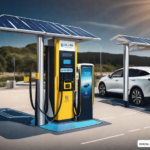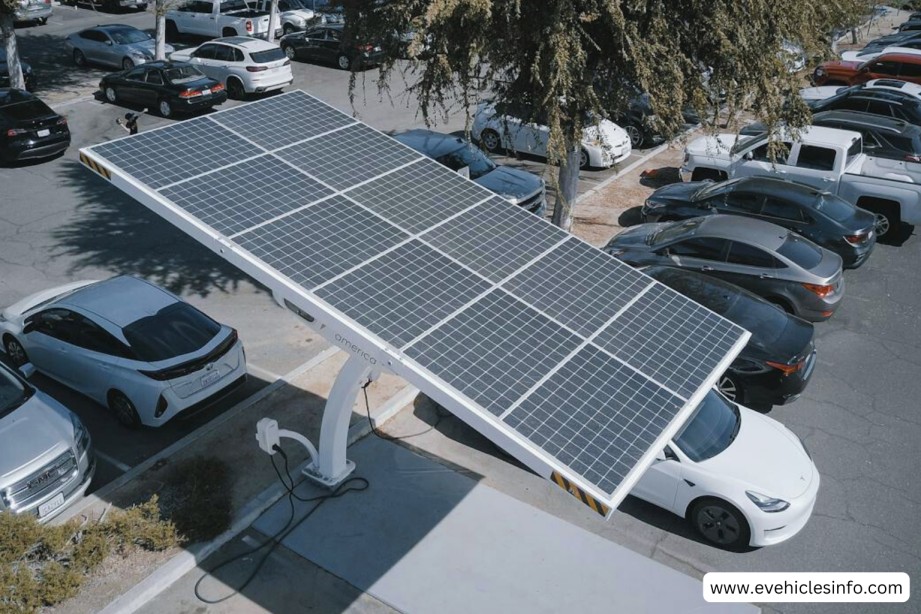Table of Contents
Hey there Electric Vehicles lovers! Ever wonder why solar charging stations are so widely used and how they’re altering society in the modern era? let’s discuss it!
Imagine living in a society where you help with lowering your environmental impact and your automobile is powered entirely by solar energy. Doesn’t it sound like a dream? However, as solar charging stations proliferate, this ideal is becoming a reality.
Solar-powered charging stations for electric vehicles are a sustainable and environmentally friendly way to charge electric cars. They use solar panels to harness the energy from the sun and convert it into electricity that can be used to charge electric cars. This innovative solution to the challenge of charging electric cars has gained popularity as the demand for electric vehicles continues to grow.
The basic components of a solar-powered EV charging station include solar panels, an inverter, a charging point, and a battery storage system. The solar panels collect sunlight and convert it into DC power, which the inverter converts into AC power. The charging point then connects to the electric car and provides it with the energy it needs to charge its battery. The battery storage system is used to store excess energy for use when the sun is not shining.
A solar-powered electric vehicle (EV) is a type of EV that is powered by energy generated from solar panels. Solar panels are installed on the vehicle’s roof, hood, or trunk to collect energy from the sun, which is then converted into electricity to power the vehicle’s electric motor.
While solar-powered EVs are still a relatively new technology and not yet widely available, several companies are developing and testing these vehicles. Some examples include Light Year, Sono Motors, and Aptera. These companies are designing EVs with solar panels integrated into the vehicle’s body, allowing for extended driving range and reduced reliance on external charging infrastructure. A solar-powered electric vehicle (EV) is a type of EV that is powered by energy generated from solar panels. Solar panels are installed on the vehicle’s roof, hood, or trunk to collect energy from the sun, which is then converted into electricity to power the vehicle’s electric motor.
Let’s take a look at the world of solar-powered electric car charging stations, which are unique and have completely shifted to the face of environmentally friendly transportation. But there are more awesome benefits to these solar-powered EV charging stations than just being environmentally conscious!
Advantages of solar-powered Electric Vehicles Charging Station:
- Renewable energy source: Solar-powered charging stations use energy from the sun, which is a renewable and environmentally friendly source of energy. This helps to reduce our reliance on fossil fuels and decrease our carbon footprint.
- Cost-effective: Solar-powered charging stations eliminate the need for expensive infrastructure and maintenance costs associated with traditional fossil fuel-based power grids. Furthermore, the cost of solar panel technology has decreased significantly in recent years, making it an increasingly affordable and accessible option for electric vehicle owners.
- Flexibility and portability: Solar-powered charging stations can be installed in remote locations where there is no access to the grid, making them particularly useful in rural areas or on highways. Furthermore, they can be moved to different locations as needed, making them a versatile and adaptable option for charging electric vehicles.
- Standalone or integrated options: There are various types of solar-powered charging stations available. Some are standalone charging stations, while others can be integrated into existing parking structures or buildings. This makes them suitable for a wide range of applications and locations.
- Reduce demand on the grid: Solar-powered charging stations can help to reduce the demand on the power grid, particularly during peak hours when demand is highest. This can help to reduce the risk of blackouts and brownouts, as well as the need for costly upgrades to the power grid infrastructure.
Let’s talk honestly about something we’ve all been wondering about the less-than-ideal aspects of solar-powered EV charging stations. We’re all for green energy and futuristic vibes, don’t get us wrong, but it’s time to dig deeper and discover what’s going on.
Disadvantages of solar-powered Electric Vehicles Charging Station:
- Space limitations: Solar panels require significant space to generate enough energy to charge electric vehicles efficiently. In urban areas with limited open space, it may be difficult to find suitable locations for solar-powered charging stations.
- Weather dependency: The amount of energy generated by solar panels is dependent on weather conditions, particularly sunlight. During periods of low sunlight, solar-powered charging stations may not be able to generate enough energy to charge electric vehicles efficiently.
- High initial investment: While the cost of solar panel technology has decreased significantly in recent years, the initial investment in installing solar-powered charging stations can still be high. This may deter some businesses and individuals from adopting this technology.
- Maintenance and upkeep costs: Solar-powered charging stations require regular maintenance to ensure optimal performance. This includes cleaning the solar panels, checking the battery storage system, and maintaining the charging points. These maintenance costs can add up over time.
- Battery limitations: Solar-powered charging stations rely on battery storage systems to store excess energy for use when the sun is not shining. However, these batteries have a limited lifespan and may need to be replaced over time, which can be costly.
In conclusion, solar-powered EV charging stations are an innovative and sustainable solution to the challenge of charging electric cars. They provide a reliable source of renewable energy, reduce our reliance on fossil fuels, and are cost-effective and flexible. While there are some challenges associated with their installation and maintenance, the benefits of using solar power for charging electric vehicles are undeniable. As the demand for electric vehicles continues to grow, we can expect to see more of these charging stations popping up around the world.












One thought on “Exploring Best Solar Stations for Electric Vehicles”